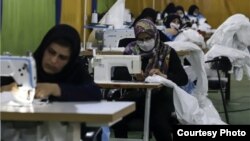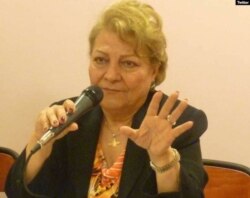A prominent Iranian women's rights activist says the coronavirus has made it much harder for women — many of whom are sole breadwinners — to meet their families' daily needs.
Speaking to VOA Persian by phone from her home in Tehran last Thursday, Giti Pourfazel said before the pandemic, many Iranian women made only a small income from selling handicrafts or working in factories.
"Under stay-at-home and quarantine orders, they face considerable problems in meeting their daily needs and those of their families," she said.
Iran's Islamist rulers shut down much of the economy last month and urged people to stay home to curb the nation's pandemic, which has been the largest and deadliest in the region.
Declaring the worst of the outbreak to be behind them this month, Iranian officials began allowing economic activities to resume nationwide, while urging citizens to maintain social distancing and other health precautions.
Iran's economy has been in a recession since 2018, when its long-running problems with government mismanagement and corruption were compounded by the United States toughening unilateral sanctions aimed at pressuring Tehran to end perceived malign behaviors.
An International Monetary Fund report released April 14 said Iran saw its recession deepen in 2019, with GDP shrinking 7.6% after a 5.4% contraction the year before. The IMF also projected Iran would see a third consecutive year of recession in 2020, with GDP contracting a further 6%.
Iran's shrinking economy and corresponding surge in unemployment, especially among men, has forced more women into becoming family breadwinners, or heads of household, according to a Feb. 12 article by Iranian state-approved news agency Rokna.
Rokna cited comments from Iranian lawmaker Nahid Tajeddin, who told parliamentary news site ICANA last August that there were more than 3 million female-headed households in the country, a number she said had increased significantly in the past decade relative to the growth in male-headed households. Tajeddin attributed the figure to Masoumeh Ebtekar, Iranian vice president for women and family affairs.
The Iranian lawmaker, who represents the central city of Isfahan, said divorce is another major reason for the rise in the number of female-headed households.
The increase also has resulted in more teenage girls leading households while they struggle with the impact of the pandemic.
The director of an Iranian anti-poverty organization interviewed in Rokna's February article said her group assists female heads-of-household whose ages typically range from 60 to 18.
"In some Iranian tribes where child marriage is common, girls between the ages of 14 and 15 also have to take care of their families," Zahra Rahimi of the Imam Ali's Popular Students Relief Society was quoted as saying.
Pourfazel told VOA the pandemic has caused further hardship not only for female heads-of-household but also for Iranians whose poverty has left them malnourished.
"These poor people lack strong immune systems and are more vulnerable to dying from COVID-19," she said.
A retired lawyer, Pourfazel was one of 14 female Iranian activists who signed an Aug. 9, 2019, open letter calling for the resignation of Iranian Supreme Leader Ayatollah Ali Khamenei and the introduction of a new constitution enshrining equal rights for women.
Iranian authorities arrested her on Aug. 19, and later charged her and other signatories with national security offenses. She was released on bail Nov. 13.
Pourfazel retired as a lawyer in 2016 after nearly 10 years defending political prisoners and their family members, usually for free. In an interview with the New York-based Center for Human Rights in Iran, she said she had faced persistent harassment from Iranian intelligence agents in response to her work and no longer had the mental strength to continue.
Earlier this month, Pourfazel and nine other Iranian rights activists wrote an open letter to the World Health Organization, saying they had formed a "National Relief Committee" to appeal for more international aid for Iran's battle against the pandemic. They said the new committee also would monitor the government's usage of such aid to prevent further corruption and mismanagement.
Mehdi Jedinia contributed to this report. This article originated in VOA's Persian Service.





